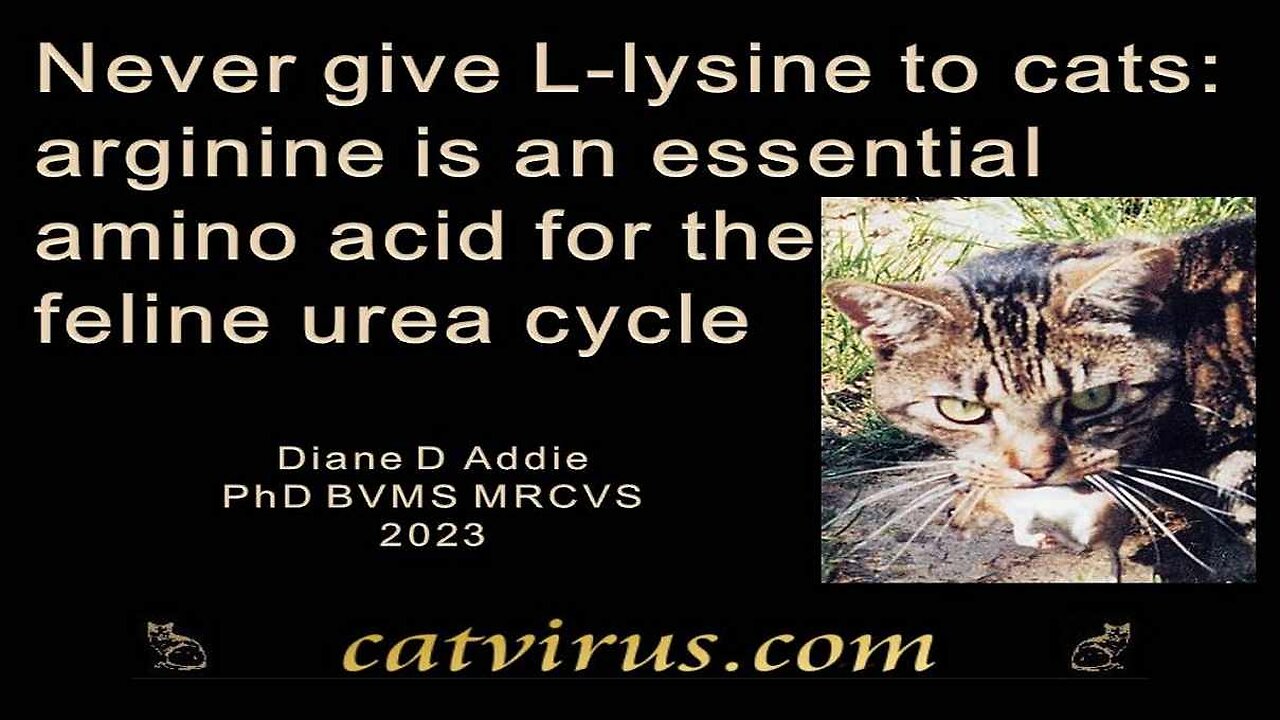Premium Only Content

Arginine is an essential amino acid for the feline urea cycle: never give L-lysine to cats
L-LYSINE SUPPLEMENTS SHOULD NOT BE GIVEN TO CATS, because L-lysine is antagonistic to L-arginine which is an essential amino acid for cats, meaning that they have to get L-arginine in their food: cats rapidly sicken without it. L-arginine is found in meat: cats are obligate carnivores. This video explains why dietary L-arginine is essential for the urea cycle to work in the cat (whereas humans can be vegans and our urea cycles still function). L-arginine is also essential for macrophage function.
Three key enzymes compete for available L-arginine: arginase-1 in the urea cycle, inducible nitric oxide synthase in M1 macrophages and arginase-2 in M2 macrophages. When L-arginine is in short supply it will preferentially go to the urea cycle rather than the immune system. Macrophages are key cells for immune function and are the target cell in feline infectious peritonitis (FIP) development.
Are cats with low plasma arginine more likely to develop FIP? I don’t know, but I suspect the answer will be yes. I do know that lowering their plasma arginine by using L-lysine will sabotage their ability to recover, and I suspect that using L-lysine in feline coronavirus (FCoV) infected cats will make them more likely to develop FIP.
LINKS:
For further information on feline CoV and FIP treatment, please visit www.catvirus.com.
KEY REFERENCES:
Bol S, Bunnik EM. Lysine supplementation is not effective for the prevention or treatment of feline herpesvirus 1 infection in cats: a systematic review. BMC Vet Res. 2015;11:284. doi: 10.1186/s12917-015-0594-3.
Morris JG, Rogers QR. Ammonia intoxication in the near-adult cat as a result of a dietary deficiency of arginine. Science. 1978;199(4327):431–2.
WHO IS DR ADDIE?
Diane Addie is a veterinary virologist, she was a Senior Lecturer and Head of Diagnostic Virology at the University of Glasgow Veterinary School. For over three decades her research has been devoted to feline coronavirus (FCoV), and her website, www.catvirus.com aims to supply difficult to source information on FCoV, FIP and chronic gingivostomatitis. She is a member of the European Advisory Board of Cat Disease, but the views expressed in this video are her own.
-
 18:38
18:38
DeVory Darkins
1 day ago $22.39 earnedTrump Makes HUGE Announcement that may spark GOP Battle
63.5K76 -
 2:13:05
2:13:05
The Nerd Realm
11 hours ago $3.52 earnedNew Years Eve! Fortnite Hunters w/ YOU! Creator Code: NERDREALM
54.1K3 -
 11:04:44
11:04:44
FusedAegisTV
1 day agoNYE Eve! - 2025 Incoming 🎉 - 12hr Variety Stream!
114K5 -
 1:18:52
1:18:52
Awaken With JP
14 hours agoSomehow The World DIDN’T End This Year! - LIES Ep 72
154K77 -
 1:19:34
1:19:34
Michael Franzese
12 hours agoWhat 2024 Taught Us About the Future?
124K31 -
 1:48:09
1:48:09
The Quartering
12 hours agoBird Flu PANIC, Sam Hyde DESTROYS Elon Musk & Patrick Bet David & Woke Witcher?
131K74 -
 4:47
4:47
SLS - Street League Skateboarding
3 days agoLiz Akama’s 2nd Place Finish at SLS Tokyo 2024 | Best Tricks
56.6K5 -
 4:06:54
4:06:54
LumpyPotatoX2
11 hours agoHappy New Year Rumble ! - #RumbleGaming
40.8K -
 10:37
10:37
One Bite Pizza Reviews
1 day agoBest of Barstool Pizza Reviews 2024
66.5K32 -
 2:37
2:37
Tate Speech by Andrew Tate
14 hours ago2025 WILL BE YOUR YEAR
113K38